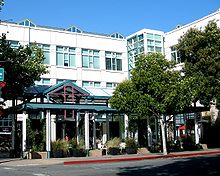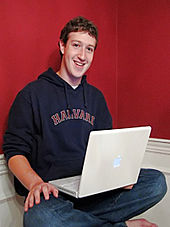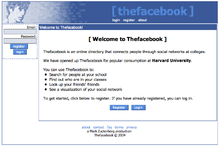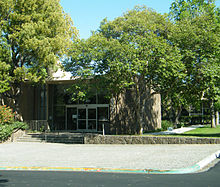- History of Facebook
-
See also: Timeline of Facebook
This is a history of the social network service, Facebook.
Contents
Facemash
In early 2003, Adam D'Angelo, then a Caltech student who had been Mark Zuckerberg's best friend in high school, had developed the experimental, rudimentary social networking website Buddy Zoo, that was used by hundreds of thousands of people before D'Angelo shut it down. That summer, Zuckerberg and friends who were also computer science students worked coding for the summer in Boston and discussed the implication of D'Angelo's website's success with regard to the future of social networking on the Internet.[1] In the fall, Zuckerberg, returning for his sophomore year at Harvard, wrote CourseMatch, a briefly popular site that helped Harvard students figure out what courses their friends were taking;[1] and then, on October 28, 2003, he wrote Facemash, a site that, according to the Harvard Crimson, represented a Harvard University version of Hot or Not.[2]
That night, Zuckerberg made the following blog entries:[3][4][5]
I'm a little intoxicated, not gonna lie. So what if it's not even 10 pm and it's a Tuesday night? What? The Kirkland [dorm] facebook is open on my desktop and some of these people have pretty horrendous facebook pics. I almost want to put some of these faces next to pictures of farm animals and have people vote on which is more attractive.—9:48 pmYea, it's on. I'm not exactly sure how the farm animals are going to fit into this whole thing (you can't really ever be sure with farm animals...), but I like the idea of comparing two people together.—11:09 pmLet the hacking begin.—12:58 amAccording to The Harvard Crimson, Facemash "used photos compiled from the online facebooks of nine Houses, placing two next to each other at a time and asking users to choose the 'hotter' person". To accomplish this, Zuckerberg hacked into the protected areas of Harvard's computer network and copied the houses' private dormitory ID images.
Harvard at that time did not have a student directory with photos, and basic information and the initial site generated 450 visitors and 22,000 photo-views in its first four hours online.[6] That the initial site mirrored people’s physical community—with their real identities—represented the key aspects of what later became Facebook.[7]
"Perhaps Harvard will squelch it for legal reasons without realizing its value as a venture that could possibly be expanded to other schools (maybe even ones with good-looking people...)," Zuckerberg wrote in his personal blog. "But one thing is certain, and it’s that I’m a jerk for making this site. Oh well. Someone had to do it eventually..."[8] The site was quickly forwarded to several campus group list-servers but was shut down a few days later by the Harvard administration. Zuckerberg was charged by the administration with breach of security, violating copyrights, and violating individual privacy, and faced expulsion, but ultimately the charges were dropped.[9]
Zuckerberg expanded on this initial project that semester by creating a social study tool ahead of an art history final by uploading 500 Augustan images to a website, with one image per page along with a comment section.[7] He opened the site up to his classmates and people started sharing their notes. "The professor said it had the best grades of any final he’d ever given. This was my first social hack. With Facebook, I wanted to make something that would make Harvard more open," Zuckerberg said in a TechCrunch interview.
On Oct 25, 2010, entrepreneur and banker Rahul Jain auctioned off FaceMash.com to an unknown buyer for $30,201.[10][11]
thefacebook
In January 2004, the following semester, Zuckerberg began writing code for a new website. He was inspired, he said, by an editorial in The Harvard Crimson about the Facemash incident. "It is clear that the technology needed to create a centralized Website is readily available," the paper observed. "The benefits are many."[3] On February 4, 2004, Zuckerberg launched "Thefacebook", originally located at thefacebook.com.[12] "Everyone’s been talking a lot about a universal face book within Harvard," Zuckerberg told The Harvard Crimson. "I think it’s kind of silly that it would take the University a couple of years to get around to it. I can do it better than they can, and I can do it in a week."[13] "When Mark finished the site, he told a couple of friends. And then one of them suggested putting it on the Kirkland House online mailing list, which was...three hundred people," according to roommate Dustin Moskovitz. "And, once they did that, several dozen people joined, and then they were telling people at the other houses. By the end of the night, we were...actively watching the registration process. Within twenty-four hours, we had somewhere between twelve hundred and fifteen hundred registrants."[14]
Just six days after the site launched, three Harvard seniors, Cameron Winklevoss, Tyler Winklevoss, and Divya Narendra, accused Zuckerberg of intentionally misleading them into believing he would help them build a social network called HarvardConnection.com, while he was instead using their ideas to build a competing product.[15]
The three complained to the Harvard Crimson and the newspaper began an investigation. Zuckerberg used his site, TheFacebook.com, to look up members of the site who identified themselves as members of the Crimson. Then he examined a log of failed logins to see if any of the Crimson members had ever entered an incorrect password into TheFacebook.com. In the cases in which they had entered failed logins, Mark tried to use them to access the Crimson members' Harvard email accounts. He successfully accessed two of them.[15] The three later filed a lawsuit against Zuckerberg, later settling.[16]
Membership was initially restricted to students of Harvard College, and within the first month, more than half the undergraduate population at Harvard was registered on the service.[17] Eduardo Saverin (business aspects), Dustin Moskovitz (programmer), Andrew McCollum (graphic artist), and Chris Hughes soon joined Zuckerberg to help promote the website. In March 2004, Facebook expanded to Stanford, Columbia, and Yale.[18] This expansion continued when it opened to all Ivy League and Boston area schools, and gradually most universities in Canada and the United States.[19][20][21] Facebook incorporated in the summer of 2004 and the entrepreneur Sean Parker, who had been informally advising Zuckerberg, became the company's president.[22] In June 2004, Facebook moved its base of operations to Palo Alto, California.[18] The company dropped The from its name after purchasing the domain name facebook.com in 2005 for $200,000.[23]
Facebook
Total active users[N 1] Date Users
(in millions)Days later Monthly growth[N 2] August 26, 2008 100[24] 1,665 178.38% April 8, 2009 200[25] 225 13.33% September 15, 2009 300[26] 160 9.38% February 5, 2010 400[27] 143 6.99% July 21, 2010 500[28] 166 4.52% January 5, 2011 600[29][N 3] 168 3.57% May 30, 2011 700[30] 145 3.45% September 22, 2011 800[31] 115 3.73% On October 1, 2005, Facebook expanded to twenty-one universities in the United Kingdom, the entire Instituto Tecnologico y de Estudios Superiores de Monterrey (ITESM) system in Mexico, the entire University of Puerto Rico network in Puerto Rico, and the whole University of the Virgin Islands network in the U.S. Virgin Islands. Facebook launched a high school version in September 2005, which Zuckerberg called the next logical step.[32] At that time, high school networks required an invitation to join.[33] Facebook later expanded membership eligibility to employees of several companies, including Apple Inc. and Microsoft.[34] On December 11, 2005, universities in Australia and New Zealand were added to the Facebook network, bringing its size to 2,000+ colleges and 25,000 + high schools throughout the United States, Canada, Mexico, the United Kingdom, Australia, New Zealand, and Ireland. Facebook was then opened on September 26, 2006, to everyone of ages 13 and older with a valid e-mail address.[35][36] In October 2008, Facebook announced that it was to set up its international headquarters in Dublin, Ireland.[37]
As of July 2010, Facebook.com was the top social network across eight individual markets in the Southeast Asia/Oceania region (Philippines, Australia, Indonesia, Malaysia, Singapore, New Zealand, Hong Kong and Vietnam), while other brands commanded the top positions in certain markets, including Google-owned Orkut in India and Brazil, Mixi.jp in Japan, RenRen in China (where Facebook is currently inaccessible), CyWorld in South Korea and Yahoo!’s Wretch.cc in Taiwan.[citation needed] Additionally, Facebook has become the largest online photo host, being cited by Facebook application and online photo aggregator Pixable as expecting to have 100 billion photos by summer 2011 [38]
In 2010 Facebook began to pro-actively involve its users in running the website by inviting them to become beta testers after passing a question-and-answer-based selection process,[39] and also by creating a new section known as Facebook Engineering Puzzles where users would solve computational problems and then potentially be hired by Facebook.[40]
Financials
 Facebook's former headquarters in downtown Palo Alto, California.
Facebook's former headquarters in downtown Palo Alto, California.
Facebook received its first investment of US$500,000 in June 2004 from PayPal co-founder Peter Thiel, in exchange for 7% of the company.[41] This was followed a year later by $12.7 million in venture capital from Accel Partners, and then $27.5 million more from Greylock Partners.[41][42] A leaked cash flow statement showed that during the 2005 fiscal year, Facebook had a net loss of $3.63 million.[43]
With the sale of social networking website MySpace to News Corp on July 19, 2005, rumors surfaced about the possible sale of Facebook to a larger media company.[44] Zuckerberg had already said he did not want to sell the company, and denied rumors to the contrary.[45] On March 28, 2006, BusinessWeek reported that a potential acquisition of Facebook was under negotiation. Facebook reportedly declined an offer of $750 million from an unknown bidder, and it was rumored the asking price rose as high as $2 billion.[46]
In September 2006, serious talks between Facebook and Yahoo! took place concerning acquisition of Facebook, with prices reaching as high as $1 billion.[47][48] Thiel, by then a board member of Facebook, indicated that Facebook's internal valuation was around $8 billion based on their projected revenues of $1 billion by 2015, comparable to Viacom's MTV brand, a company with a shared target demographic audience.[49]
On July 17, 2007, Zuckerberg said that selling Facebook was unlikely because he wanted to keep it independent, saying "We're not really looking to sell the company... We're not looking to IPO anytime soon. It's just not the core focus of the company."[50] In September 2007, Microsoft approached Facebook, proposing an investment in return for a 5% stake in the company, offering an estimated $300–500 million.[51] That month, other companies, including Google, expressed interest in buying a portion of Facebook.[52]
On October 24, 2007, Microsoft announced that it had purchased a 1.6% share of Facebook for $240 million, giving Facebook a total implied value of around $15 billion.[53] However, Microsoft bought preferred stock that carried special rights, such as "liquidation preferences" that meant Microsoft would get paid before common stockholders if the company is sold. Microsoft's purchase also included rights to place international ads on Facebook.[54] In November 2007, Hong Kong billionaire Li Ka-shing invested $60 million in Facebook.[55]
In August 2008, BusinessWeek reported that private sales by employees, as well as purchases by venture capital firms, had and were being done at share prices that put the company's total valuation at between $3.75 billion and $5 billion.[54] In October 2008, Zuckerberg said "I don't think social networks can be monetized in the same way that search did... In three years from now we have to figure out what the optimum model is. But that is not our primary focus today."[56]
In August 2009, Facebook acquired social media real-time news aggregator FriendFeed,[57] a startup created by the former Google employee and Gmail's first engineer Paul Buchheit who, while at Google, coined the phrase "Don't be evil".[58][59][60] In September 2009, Facebook claimed that it had turned cash flow positive for the first time.[61] In February 2010, Facebook acquired Malaysian contact-importing startup Octazen Solutions.[62] On April 2, 2010, Facebook announced acquisition of photo-sharing service called Divvyshot for an undisclosed amount.[63] In June 2010, an online marketplace for trading private company stock reflected a valuation of $11.5 billion.[64]
At the All Things Digital conference in June 2010, Zuckerberg was asked if he expected to remain CEO if the company went public. Zuckerberg said he did, adding that he doesn't "think about going public ... much." He said he did not have a date in mind for a potential IPO.[65][66]
Notes
- ^ An "active user" is defined by Facebook as a user who has visited the website in the last 30 days.
- ^ "Monthly growth" is the average percentage growth rate at which the total number of active users grows each month over the specified period.
- ^ This value is from an investment document. The date is from when the document was revealed to the public, not the actual date that the website reached this many users.
References
- ^ a b Kirkpatrick, David (October 14, 2010). "The Social Network: a misleading view of Facebook's birth". The Telegraph.
- ^ Tabak, Alan J. (February 9, 2004). "Hundreds Register for New Facebook Website". Harvard Crimson. http://web.archive.org/web/20050403215543/www.thecrimson.com/article.aspx?ref=357292. Retrieved November 7, 2008.
- ^ a b Hoffman, Claire (June 28, 2008). "The Battle for Facebook". Rolling Stone. http://www.rollingstone.com/culture/news/17389/203822. Retrieved February 5, 2009.
- ^ Schwartz, Bari (November 4, 2003). "Hot or Not? Website Briefly Judges Looks". Harvard Crimson. http://www.thecrimson.com/article.aspx?ref=349808. Retrieved July 26, 2009.
- ^ "Facemash Returns As (What Else?) A Facebook App Called ULiken". Tech Crunch. May 13, 2008. http://www.techcrunch.com/2008/05/13/facemash-returns-as-what-else-a-facebook-app-uliken/. Retrieved February 5, 2009.
- ^ Locke, Laura. "The Future of Facebook", Time Magazine, July 17, 2007. Retrieved November 13, 2009.
- ^ a b McGirt, Ellen. "Facebook's Mark Zuckerberg: Hacker. Dropout. CEO. ", Fast Company, May 1, 2007. Retrieved November 5, 2009.
- ^ O'Brien, Luke (November/December 2007). "Poking Facebook". 02138: p. 66. http://www.02138mag.com/magazine/article/1724.html. Retrieved June 26, 2008.
- ^ Kaplan, Katherine (November 19, 2003). "Facemash Creator Survives Ad Board". The Harvard Crimson. http://www.thecrimson.com/article.aspx?ref=350143. Retrieved February 5, 2009.
- ^ Li, Natalie, "Facemash.com, Zuckerberg's Former Website, Sold for $30K", The Harvard Crimson, November 19, 2010
- ^ Manker, Rob, "FaceMash.com, the forerunner to Facebook, up for auction", The Chicago Tribune, October 18, 2010
- ^ Seward, Zachary M. (25 July 2007). "Judge Expresses Skepticism About Facebook Lawsuit". The Wall Street Journal. http://online.wsj.com/article/SB118539991204578084.html?mod=googlenews_wsj. Retrieved 30 April 2008.
- ^ Tabak, Alan (9 February 2004). "Hundreds Register for New Facebook Website". The Harvard Crimson. http://www.thecrimson.com/article.aspx?ref=357292. Retrieved 7 November 2008.
- ^ Cassidy, John (13 May 2006). "Me Media". The New Yorker. http://www.newyorker.com/archive/2006/05/15/060515fa_fact_cassidy. Retrieved 20 July 2009.
- ^ a b Carlson, Nicolas (5 March 2010). "In 2004, Mark Zuckerberg Broke Into A Facebook User's Private Email Account". Business Insider. http://www.businessinsider.com/how-mark-zuckerberg-hacked-into-the-harvard-crimson-2010-3. Retrieved 5 March 2010.
- ^ Brad Stone (28 June 2008). "Judge Ends Facebook’s Feud With ConnectU". The New York Time. http://bits.blogs.nytimes.com/2008/06/26/judge-ends-facebooks-feud-with-connectu/index.html.
- ^ Phillips, Sarah (25 July 2007). "A brief history of Facebook". The Guardian (London). http://www.guardian.co.uk/technology/2007/jul/25/media.newmedia. Retrieved 7 March 2008.
- ^ a b "Press Room". Facebook. 1 January 2007. http://www.facebook.com/press/info.php?timeline. Retrieved 5 March 2008.
- ^ Rosmarin, Rachel (11 September 2006). "Open Facebook". Forbes. http://www.forbes.com/2006/09/11/facebook-opens-up-cx_rr_0911facebook.html. Retrieved 13 June 2008.
- ^ Rotberg, Emily, "Thefacebook.com opens to Duke students", The Chronicle, Duke University, April 14, 2004 (archived 2005)
- ^ Metz, Rachel, "College Facebook Mugs Go Online", Wired magazine, June 9, 2004
- ^ Rosen, Ellen (26 May 2005). "Student's Start-Up Draws Attention and $13 Million". The New York Times. http://www.nytimes.com/2005/05/26/business/26sbiz.html?_r=2&scp=1&sq=thefacebook+parker&st=nyt. Retrieved 18 May 2009.
- ^ Williams, Chris (1 October 2007). "Facebook wins Manx battle for face-book.com". The Register. http://www.theregister.co.uk/2007/10/01/facebook_domain_dispute/. Retrieved 13 June 2008.
- ^ Zuckerberg, Mark (August 26, 2008). "Our First 100 Million". The Facebook Blog. http://blog.facebook.com/blog.php?post=28111272130. Retrieved June 26, 2010.
- ^ Zuckerberg, Mark (April 8, 2009). "200 Million Strong". The Facebook Blog. http://blog.facebook.com/blog.php?post=72353897130. Retrieved June 26, 2010.
- ^ Zuckerberg, Mark (September 15, 2009). "300 Million and On". The Facebook Blog. http://blog.facebook.com/blog.php?post=136782277130. Retrieved June 26, 2010.
- ^ "New navigation for users and 400 million active users announcement". Facebook. February 4, 2010. http://www.facebook.com/notes/facebook-ads/new-navigation-for-users-and-400-million-active-users-announcement/326050130129. Retrieved June 26, 2010.
- ^ Zuckerberg, Mark (July 21, 2010). "500 Million Stories". The Facebook Blog. http://blog.facebook.com/blog.php?post=409753352130. Retrieved July 21, 2010.
- ^ Carlson, Nicholas (January 5, 2011). "Goldman to clients: Facebook has 600 million users". MSNBC. http://www.msnbc.msn.com/id/40929239/ns/technology_and_science-tech_and_gadgets/. Retrieved February 11, 2011.
- ^ Socialbakers employee (May 30, 2011). "Facebook is globally closing in to 700 million users!". Socialbakers. http://www.socialbakers.com/blog/171-facebook-is-globally-closing-in-to-700-million-users/.
- ^ Adam Ostrow (September 22, 2011). "Facebook Now Has 800 Million Users". Mashable. http://mashable.com/2011/09/22/facebook-800-million-users/. Retrieved September 26, 2011.
- ^ Dempsey, Laura (August 3, 2006). "Facebook is the go-to Web site for students looking to hook up". Dayton Daily News.
- ^ Lerer, Lisa (January 25, 2007). "Why MySpace Doesn't Card". Forbes. http://www.forbes.com/security/2007/01/25/myspace-security-identity-tech-security-cx_ll_0124myspaceage.html. Retrieved June 13, 2008.
- ^ Lacy, Sarah (September 12, 2006). "Facebook: Opening the Doors Wider". BusinessWeek. http://www.businessweek.com/technology/content/sep2006/tc20060912_682123.htm?chan=top+news_top+news+index_technology. Retrieved March 9, 2008.
- ^ Abram, Carolyn (September 26, 2006). "Welcome to Facebook, everyone". Facebook. http://blog.facebook.com/blog.php?post=2210227130. Retrieved March 8, 2008.
- ^ "Terms of Use". Facebook. November 15, 2007. http://www.facebook.com/terms.php. Retrieved March 5, 2008.
- ^ "Press Releases". Facebook. November 30, 2005. http://www.facebook.com/press/releases.php?p=59042. Retrieved November 30, 2008.
- ^ http://mashable.com/2011/02/14/facebook-photo-infographic/?asid=c228f21b
- ^ Catacchio, Chad. "Facebook Inviting Beta Testers For New Questions Feature". TNW Social Media. http://thenextweb.com/socialmedia/2010/06/14/facebook-inviting-beta-testers-for-new-questions-feature/. Retrieved August 14, 2010.
- ^ Facebook Engineering Puzzles
- ^ a b "Why you should beware of Facebook". The Age. Australia. January 20, 2008. http://www.theage.com.au/news/general/beware-facebook/2008/01/18/1200620184398.html?page=fullpage#contentSwap2. Retrieved April 30, 2008.
- ^ Teller, Sam (April 25, 2006). "Investors Add $25M to Facebook’s Coffers". The Harvard Crimson. Archived from the original on April 25, 2006. http://web.archive.org/web/20070818200839/http://www.thecrimson.com/article.aspx?ref=503336. Retrieved March 8, 2008.
- ^ "Statement of Cash Flows". 02138. http://www.02138mag.com/asset/1138.html. Retrieved April 30, 2008.[dead link]
- ^ "News Corp in $580 m internet buy". BBC News. July 19, 2005. http://news.bbc.co.uk/2/hi/business/4695495.stm. Retrieved March 7, 2008.
- ^ Zuckerberg, Mark (September 8, 2006). "Free Flow of Information on the Internet discussions". Facebook. http://facebook.com/topic.php?uid=2208601394&topic=1841&start=500#post5339. Retrieved September 13, 2006.
- ^ Rosenbush, Steve (March 28, 1916). "Facebook's on the Block". BusinessWeek. http://www.businessweek.com/technology/content/mar2006/tc20060327_215976.htm. Retrieved April 3, 2006.
- ^ Delaney, Kevin (September 21, 2006). "Facebook, Riding a Web Trend, Flirts With a Big-Money Deal". Dow Jones & Company. p. 1.
- ^ Seid, Jessica, "Is Facebook worth a billion bucks?: Wall Street thinks social networking site would be a good deal for Yahoo, but college students are divided on its worth", CNNMoney.com, September 22, 2006
- ^ Sullivan, Brian (December 15, 2006). "Facebook, Courted By Yahoo, Won't Sell, Director Says (Update3)". Bloomberg L.P.. http://www.bloomberg.com/apps/news?pid=20601204&sid=aqwoCAVu._zA. Retrieved April 30, 2008.
- ^ Locke, Laura (June 17, 2007). "The Future of Facebook". TIME. http://www.time.com/time/business/article/0,8599,1644040,00.html. Retrieved March 5, 2008.
- ^ Swartz, Jon (October 2, 2007). "Tech giants poke around Facebook". USA Today. http://www.usatoday.com/tech/techinvestor/corporatenews/2007-10-02-facebook-suitors_N.htm. Retrieved April 30, 2008.
- ^ Delaney, Kevin (September 25, 2007). "Microsoft Fires Volley At Google in Ad Battle". The Wall Street Journal. http://online.wsj.com/article/SB119065193646437586.html?mod=hps_us_whats_news. Retrieved March 5, 2008.
- ^ "Facebook and Microsoft Expand Strategic Alliance". Microsoft. October 24, 2007. http://www.microsoft.com/Presspass/press/2007/oct07/10-24FacebookPR.mspx. Retrieved November 8, 2007.
- ^ a b "Facebook Stock For Sale". BusinessWeek. http://www.businessweek.com/magazine/content/08_33/b4096000952343.htm?chan=rss_topEmailedStories_ssi_5. Retrieved August 6, 2008.
- ^ "Li Ka-shing invests 60 million dollars in Facebook: report". Tehran Times. December 3, 2007. http://www.tehrantimes.com/index_View.asp?code=158391. Retrieved April 30, 2008.
- ^ Peter Kafka (October 10, 2008). "Zuckerberg: Facebook Will Have A Business Plan In Three Years". Silicon Alley Insider. http://www.alleyinsider.com/2008/10/zuckerberg-facebook-will-have-a-business-plan-in-three-years.
- ^ Facebook Acquires FriendFeed Techcrunch
- ^ Paul Buchheit on Gmail, AdSense and More Google Blogoscoped
- ^ Don't Be Evil, a Trigger for Ethical Questions Google Operating System Blog
- ^ http://www.crazyengineers.com/mr-paul-buchheit-creator-of-gmail-adsense-friendfeed/ Small Talk with Mr. Paul Buchheit – Creator of Gmail, Adsense & FriendFeed!]{} CrazyEngineers
- ^ "Facebook 'cash flow positive,' signs 300M users". Cbc.ca. September 16, 2009. http://www.cbc.ca/technology/story/2009/09/16/tech-facebook-300-million-users.html. Retrieved March 23, 2010.
- ^ Arrington, Michael (February 19, 2010). "Facebook acquires contact-importing company Octazen". Techcrunch.com. http://techcrunch.com/2010/02/19/octazen-what-the-heck-did-facebook-just-buy-exactly-and-why/. Retrieved March 23, 2010.
- ^ "Facebook buys photo service Divvyshot". April 2, 2010. http://techcrunch.com/2010/04/02/facebook-buys-up-divvyshot-to-make-facebook-photos-even-better/. Retrieved April 5, 2010.
- ^ Narasu Rebbapragada (June 21, 2010). "What Is Your Facebook Data Worth?". PC World.
- ^ Oreskovic, Alexei (June 2, 2010). "Facebook CEO says no date in mind for IPO". Reuters. http://www.reuters.com/article/idUSTRE65205B20100603. Retrieved June 18, 2010.
- ^ Swisher, Kara (June 10, 2010). "Full D8 Video: Facebook CEO Mark Zuckerberg". All Things Digital. Dow Jones & Company, Inc. http://kara.allthingsd.com/20100610/full-d8-video-facebook-ceo-mark-zuckerberg/?mod=ATD_search. Retrieved June 18, 2010.
Facebook Overview Website People FoundersBoardExecutivesCurrentMark Zuckerberg (CEO) · Chris Cox (VP of Product) · Sheryl Sandberg (COO) · Elliot Schrage (VP of Global Communications, Marketing and Public Policy) · Mike Schroepfer (VP of Engineering) · Bret Taylor (CTO) · Ted Ullyot (VP and General Counsel)FormerSean Parker (President) · Owen Van Natta (COO) · Gideon Yu (CFO) · Adam D'Angelo (CTO) · Chris Kelly (Chief Privacy Officer) · Matt Cohler (VP of Product Management)Notable
employeesCurrentAndrei Alexandrescu (research scientist)FormerCharlie Cheever (programmer) · Andrew McCollum (graphic artist) · Randi Zuckerberg (marketing director)Software HipHop for PHP · Apache Cassandra · Apache Thrift · Scribe (log server) · Apache Hive · FQLOther Activity stream · f8 conference · Social graph · The Facebook Effect · The Accidental Billionaires · The Social Network · WirehogCategories:- Company histories
- History of the Internet
Wikimedia Foundation. 2010.



